广东省河源市中国教育学会中英文实验学校七年级英语下册 Unit 3 How do you get t
- 格式:doc
- 大小:47.01 KB
- 文档页数:3
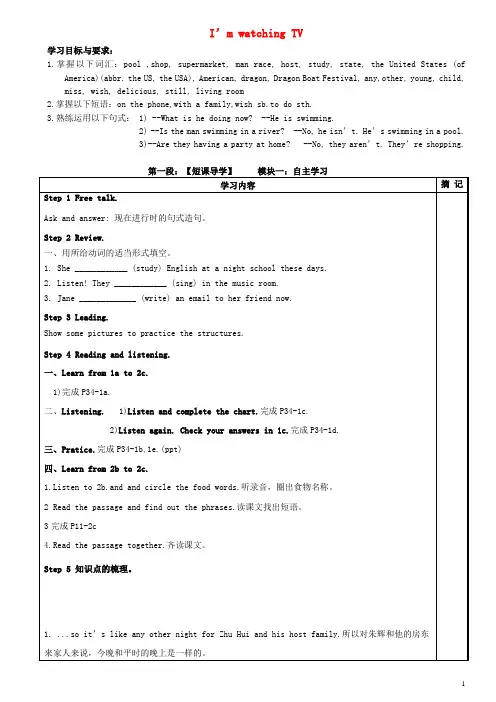
I’m watching TV学习目标与要求:1.掌握以下词汇:pool ,shop, supermarket, man race, host, study, state, the United States (ofAmerica)(abbr. the US, the USA), American, dragon, Dragon Boat Festival, any,other, young, child, miss, wish, delicious, still, living room2.掌握以下短语:on the phone,with a family,wish sb.to do sth.3.熟练运用以下句式: 1) --What is he doing now? --He is swimming.2) --Is the man swimming in a river? --No, he isn’t. He’s swimming in a pool.3)--Are they having a party at home? --No, they aren’t. They’re shopping.学习内容摘记Step 1 Free talk.Ask and answer: 现在进行时的句式造句。
Step 2 Review.一、用所给动词的适当形式填空。
1. She ____________ (study) English at a night school these days.2. Listen! They ____________ (sing) in the music room.3. Jane _____________ (write) an email to her friend now.Step 3 Leading.Show some pictures to practice the structures.Step 4 Reading and listening.一、Learn from 1a to 2c.1)完成P34-1a.二、Listening. 1)Listen and complete the chart.完成P34-1c.2)Listen again. Check your answers in 1c.完成P34-1d.三、Pratice.完成P34-1b,1e.(ppt)四、Learn from 2b to 2c.1.Listen to 2b.and and circle the food words.听录音,圈出食物名称。
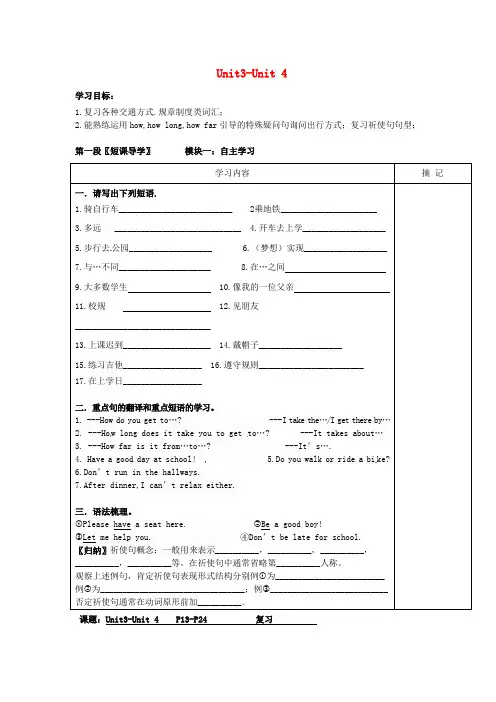
Unit3-Unit 4学习目标:1.复习各种交通方式.规章制度类词汇;2.能熟练运用how,how long,how far引导的特殊疑问句询问出行方式;复习祈使句句型;第一段〖短课导学〗模块一:自主学习学习内容摘记一.请写出下列短语.1.骑自行车__________________________ 2乘地铁______________________3.多远 _____________________________4.开车去上学___________________5.步行去公园___________________6.(梦想)实现___________________7.与…不同_____________________ 8.在…之间9.大多数学生 10.像我的一位父亲11.校规 12.见朋友_______________________________13.上课迟到____________________ 14.戴帽子___________________15.练习吉他__________________ 16.遵守规则________________________17.在上学日__________________二.重点句的翻译和重点短语的学习。
1. ---How do you get to…? ---I take the…/I get there by…2. ---How long does it take you to get to…? ---It takes about…3. ---How far is it from…to…? ---It’s….4. Have a good day at school!5.Do you walk or ride a bi ke?6.Don’t run in the hallways.7.After dinner,I can’t relax either.三.语法梳理。
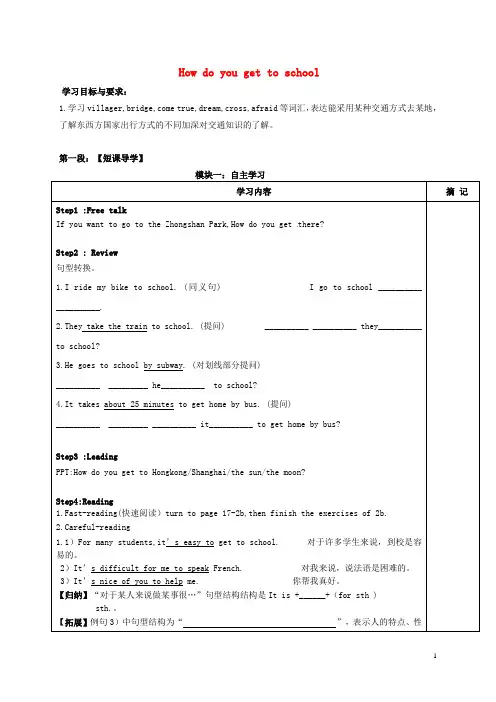
How do you get to school学习目标与要求:1.学习villager,bridge,come true,dream,cross,afraid等词汇,表达能采用某种交通方式去某地,了解东西方国家出行方式的不同加深对交通知识的了解。
第一段:【短课导学】模块一:自主学习学习内容摘记Step1 :Free talkIf you want to go to the Zhongshan Park,How do you get there?Step2 : Review句型转换。
1.I ride my bike to school. (同义句) I go to school ____________________.2.They take the train to school. (提问) __________ __________ they__________to school?3.He goes to school by subway. (对划线部分提问)__________ _________ he__________ to school?4.It takes about 25 minutes to get home by bus. (提问)__________ _________ __________ it__________ to get home by bus?Step3 :LeadingPPT:How do you get to Hongkong/Shanghai/the sun/the moon?Step4:Reading1.Fast-reading(快速阅读)turn to page 17-2b,then finish the exercises of 2b.2.Careful-reading1.1)For many students,it’s easy to get to school. 对于许多学生来说,到校是容易的。
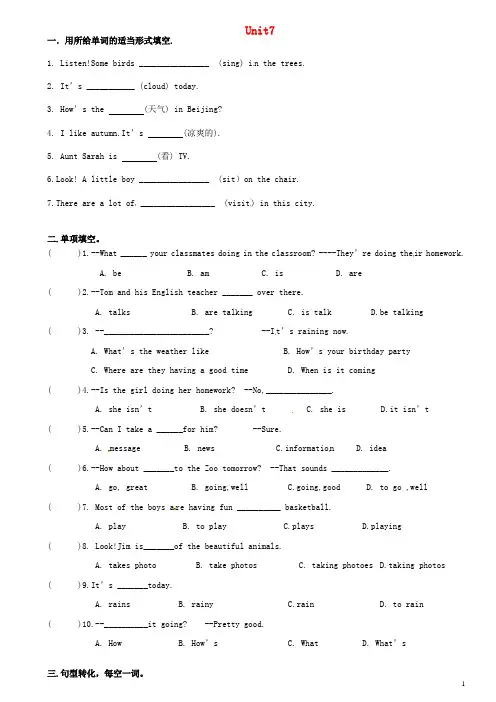
Unit7一.用所给单词的适当形式填空.1. Listen!Some birds ________________ (sing) i n the trees.2. It’s ___________ (cloud) today.3. How’s the (天气) in Beijing?4. I like autumn.It’s (凉爽的).5. Aunt Sarah is (看) TV.6.Look! A little boy ________________ (sit)on the chair.7.There are a lot of _________________ (visit) in this city.二.单项填空。
( )1.--What ______ your classmates doing in the classroom? ----They’re doing the ir homework.A. beB. amC. isD. are( )2.--Tom and his English teacher _______ over there.A. talksB. are talkingC. is talkD.be talking( )3. --________________________? --I t’s raining now.A. What’s the weather likeB. How’s your birthday partyC. Where are they having a good timeD. When is it coming( )4.--Is the girl doing her homework? --No,_______________.A. she isn’tB. she doesn’tC. she isD.it isn’t( )5.--Can I take a ______for him? --Sure.A. messageB. newsrmatio nD. idea( )6.--How about _______to the Zoo tomorrow? --That sounds _____________.A. go, greatB. going,wellC.going,goodD. to go ,well( )7. Most of the boys a re having fun __________ basketball.A. playB. to playC.playsD.playing( )8. Look!Jim is_______of the beautiful animals.A. takes photoB. take photosC. taking photoesD.taking photos( )9.It’s _______today.A. rainsB. rainyC.rainD. to rain( )10.--__________it going? --Pretty good.A. HowB. How’sC. WhatD. What’s三.句型转化,每空一词。
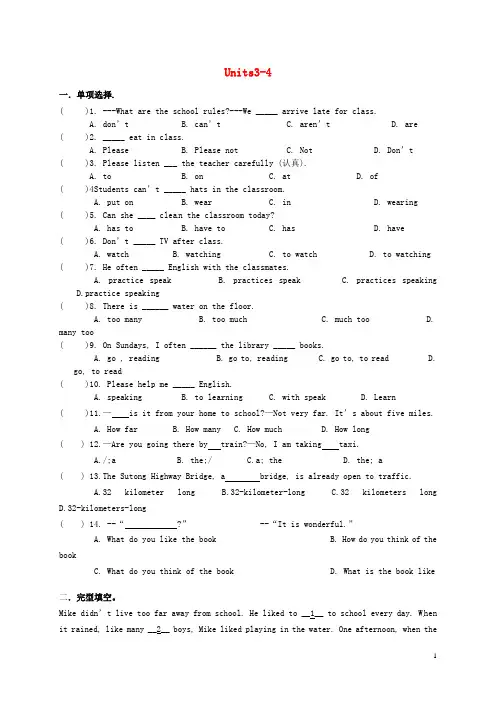
Units3-4一.单项选择.( )1. ---What are the school rules?---We _____ arrive late for class.A. don’tB. can’tC. aren’tD. are( )2. _____ eat in class.A. PleaseB. Please notC. NotD. Don’t( )3. Please listen ___ the teacher carefully (认真).A. toB. onC. atD. of( )4Students can’t _____ hats in the classroom.A. put onB. wearC. inD. wearing( )5. Can she ____ clea n the classroom today?A. has toB. have toC. hasD. have( )6. Don’t _____ TV after class.A. watchB. watchingC. to watchD. to watching ( )7. He often _____ English with the classmates.A. practice speakB. practices speakC. practices speakingD.practice speaking( )8. There is ______ water on the floor.A. too manyB. too muchC. much tooD. many too( )9. On Sundays, I often ______ the library _____ books.A. go , readingB. go to, readingC. go to, to readD.go, to read( )10. Please help me _____ English.A. speakingB. to learningC. with speakD. Learn( )11.— is it from your home to school?—Not very far. It’s about five miles.A. How farB. How manyC. How muchD. How long( ) 12.—Are you going there by train?—No, I am taking taxi.A./;aB. the;/C.a; theD. the; a( ) 13.The Sutong Highway Bridge, a bridge, is already open to traffic.A.32 kilometer longB.32-kilometer-longC.32 kilometers longD.32-kilometers-long( ) 14. --“?” --“It is wonderful.”A. What do you like the bookB. How do you think of the bookC. What do you think of the bookD. What is the book like二.完型填空。
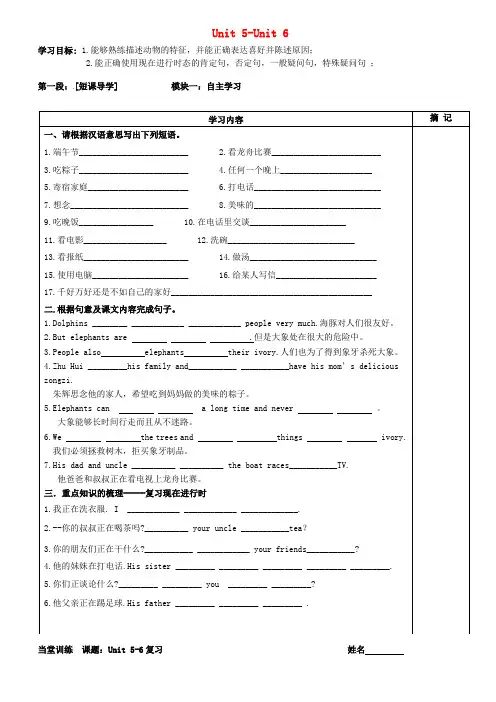
Unit 5-Unit 6学习目标: 1.能够熟练描述动物的特征,并能正确表达喜好并陈述原因;2.能正确使用现在进行时态的肯定句,否定句,一般疑问句,特殊疑问句;第一段:[短课导学] 模块一:自主学习学习内容摘记一、请根据汉语意思写出下列短语。
1.端午节_________________________2.看龙舟比赛_________________________3.吃粽子_________________________4.任何一个晚上_____________________5.寄宿家庭_______________________6.打电话_____________________________7.想念___________________________ 8.美味的_____________________________9.吃晚饭_________________ 10.在电话里交谈______________________11.看电影___________________ 12.洗碗_____________________________13.看报纸________________________ 14.做汤_____________________________15.使用电脑______________________ 16.给某人写信_______________________17.千好万好还是不如自己的家好______________________________________________二.根据句意及课文内容完成句子。
1.Dolphins ________ ____________ ____________ people very much.海豚对人们很友好。
2.But elephants are .但是大象处在很大的危险中。
3.People also elephants their ivory.人们也为了得到象牙杀死大象。
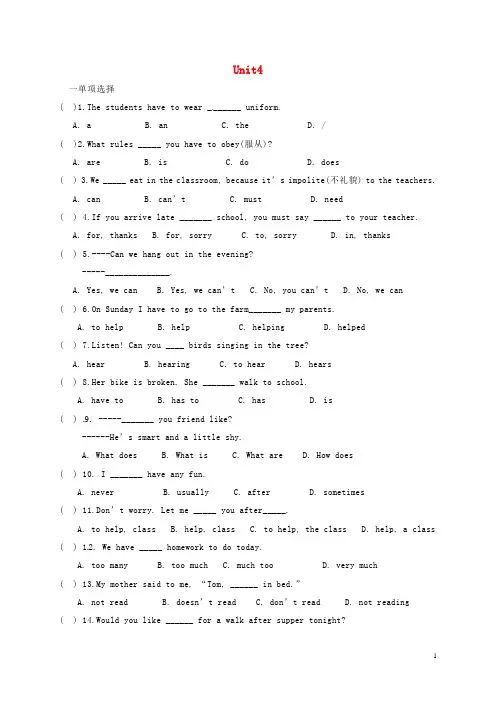
Unit4一单项选择( )1.The students have to wear _______ uniform.A. aB. anC. theD. /( )2.What rules _____ you have to obey(服从)?A. areB. isC. doD. does( ) 3.We _____ eat in the classroom, because it’s impolite(不礼貌) to the teachers.A. canB. can’tC. mustD. need( ) 4.If you arrive late _______ school, you must say ______ to your teacher.A. for, thanksB. for, sorryC. to, sorryD. in, thanks( ) 5.----Can we hang out in the evening?-----______________.A. Yes, we canB. Yes, we can’tC. No, you can’tD. No, we can( ) 6.On Sunday I have to go to the farm_______ my parents.A. to helpB. helpC. helpingD. helped( ) 7.Listen! Can you ____ birds singing in the tree?A. hearB. hearingC. to hearD. hears( ) 8.Her bike is broken. She _______ walk to school.A. have toB. has toC. hasD. is( ) 9. -----_______ you friend like?------He’s smart and a little shy.A. What doesB. What isC. What areD. How does( ) 10. I _______ have any fun.A. neverB. usuallyC. afterD. sometimes( ) 11.Don’t worry. Let me _____ you after_____.A. to help, classB. help, classC. to help, the classD. help, a class ( ) 12. We have _____ homework to do today.A. too manyB. too muchC. much tooD. very much( ) 13.My mother said to me, “Tom, ______ in bed.”A. not readB. doesn’t readC. don’t readD. not reading( ) 14.Would you like ______ for a walk after supper tonight?A. go outB. going outC. went outD. to go out( ) 15.Don’t listen ______ music in the classrooms ____the hallways.A. /. AndB. /, andC. or, andD. to, or二完形填空A wolf (狼)went to a farm. It ate the farmer’s 1 _ . The farmer was angry(生气). He had a gun(枪). He 2 __to kill the wolf.The wolf 3 away. It saw Mr. Bell on the way. Mr. Bell was 4 __. He helped the wolf. The farmer 5 __see the wolf. Later the wolf jumped out of the bag 6 Mr Bell.7 ____clever(聪明的) old man came. He made 8 jump into the bag again. He saved (救)Mr Bell. They were 9 ___.The story 10 ___us, “Never take pity on an enemy.”( )1. A fish B vegetables C sheep D fruit( )2. A want B wanted C wants D to want( )3. A run B running C ran D runs( )4. A angry B happy C clever D kind( )5. A don’t B doesn’t C didn’t D did( )6. A to eat B eat C eating D eats( )7. A An B A C The D \( )8. A the farmer B Mr. Bell C Sheep D the wolf( )9. A angry B kind C happy D unhappy( )10. A told B tells C telling D to tell三、阅读理解Mike is nine this year. He is in Grade Three. His father drives a car in a factory and his mother works in a hospital.It's a Saturday afternoon; Mike is sitting in the room and reading a book. Kate comes up to him and says, “Brother! Mummy wants you to help her.”“What does she want me to do?” asks the boy. “To wash the apples or to cut the cak es?”“Neither,” answers Kate. “She’s watering flowers in the garden. She wants you to carry some water for her.”“Why don’t you do that?”“Mummy says I’m too young.”“Don’t you see I’m busy now?”“What are you doing here, then?”“I’m reading a book. I can’t go there.”“Is this an interesting book?”“Yes, it is.”“Well, let me help you read the book and you go to help her,” says Kate. ( )1. There’re ____ people in Mike’s family.A twoB threeC fourD rive( )2. Kate is Mike’s _____.A elder sisterB young sisterC elder brotherD younger brother( )3. Tom doesn’t go to school because_____.A it’s SaturdayB he’s illC he wants to read the bookD he wants to help his mother( )4. Tom doesn’t want to help his mother because____A he’s very busyB he has some homework to doC he’s very hungryD he’s very lazy( )5. Kate comes to Mike and wants_____.A to read the bookB to carry waterC to water flowersD him to help their mother四根据句意完成已给出首字母的单词1. We must obey(服从) the school r_________.2. At school we have to clean the c__________ every day.3. They often f________ at home. Mom is very angry.4. You must wear sports s________ for gym class.5. Don’t stay o_________. Please come in.6. you can’t l________ to music in class.7. Don’t a________ late for school.8. Please speak l_________ .I can’t hear you.9. My father n_______ does the cooking. Only mom does.10. Do you want to make your o______ rules?五用括号内所给动词的适当形式填空Maria comes from America. She is twelve years old. She _1__ (study) at No.14 Middle School. She __2___ (learn) Chinese now. She wants__3_____ (learn) Chinese well. She says Chinese is interesting but very difficult, and she likes ____4___ (know) more about China.Yesterday___5__ (be) Sunday. She ___6_ (get) up very early. She ___7__ (run) for a long time. Then she stayed at home. She helped her mother with _____8___ (clean) her room. She ___9___ (do) her homework in the morning and __10___ (play) soccer in the afternoon.。
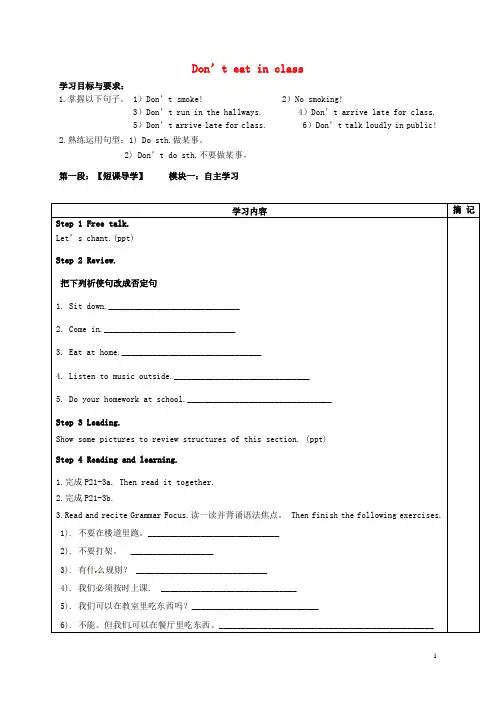
Don’t eat in class学习目标与要求:1.掌握以下句子。
1)Don’t smoke! 2)No smoking!3)Don’t run in the hallways. 4)Don’t arrive late for class.5)Don’t arrive late for class. 6)Don’t talk loudly in public!2.熟练运用句型:1)Do sth.做某事。
2) Don’t do sth.不要做某事。
第一段:【短课导学】模块一:自主学习学习内容摘记Step 1 Free talk.Let’s chant.(ppt)Step 2 Review.把下列祈使句改成否定句1. Sit down.______________________________2. Come in.______________________________3. Eat at home.________________________________4. Listen to music outside._______________________________5. Do your homework at school._________________________________Step 3 Leading.Show some pictures to review structures of this section. (ppt)Step 4 Reading and learning.1.完成P21-3a. Then read it together.2.完成P21-3b.3.Read and recite Grammar Focus.读一读并背诵语法焦点。
Then finish the following exercises.1). 不要在楼道里跑。
______________________________2). 不要打架。
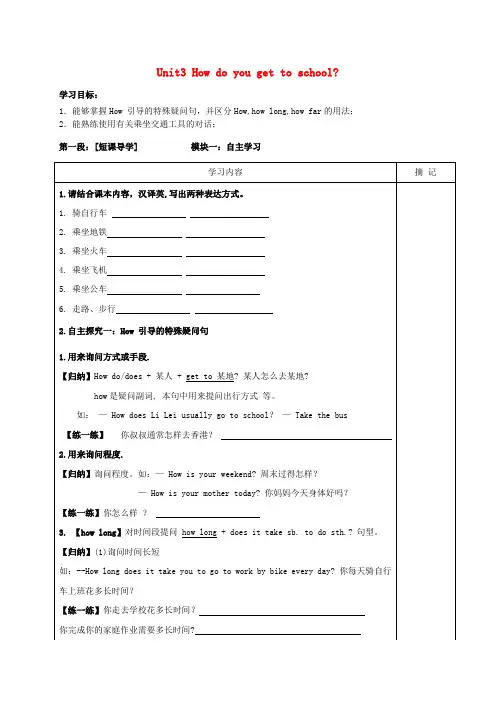
Unit3 How do you get to school? 学习目标:1.能够掌握How 引导的特殊疑问句,并区分How,how long,how far的用法;2.能熟练使用有关乘坐交通工具的对话;第一段:[短课导学] 模块一:自主学习第二段:[长课导学] 模块二:交流研讨模块三:巩固内化模块四:当堂训练 Unit3 Section A P15 第二课时一.单项选择( )1.He __________ the subway to school every day.A.takeB.takesC.takingD.took( )2.How doe s Tom’s mother __________ home?A.getB.get toC.gettingD.gets( )3.I’m going to Beijing __________ the train.A.byB.onC.rideD.take( )4.-- __________ does it take to walk to school ? --10 minutes.A.How oftenB.How longC.How manyD.How much二.按要求改写句子。
1. The bus ride usually takes about 25 minutes. (改为一般疑问句)__________the bus ride usually __________about 25 minutes?2.Jack has to go to the doctor. ( 对划线部分提问)__________does Jack __________to__________?3. They can make bread. (改为一般疑问句) __________they __________ bread? 三.补全对话。
为空格处选择恰当的句子完成对话。
Man: Excuse me, __1__.Policeman: Go down this road and turn right at the third crossing, then turn left at the fourth crossing. You can see the cinema on your right.Man: How far is it?Policeman: __2__ I think, you'd better take a bus.Man: __3__Policeman: The No.10 bus.Man: __4__.Policeman: It's over there, outside the school gate.Man: __5__Policeman: Get off at the third stop and there you are.Man: Thanks a lot.1.______2.______3._______4.______5._______。
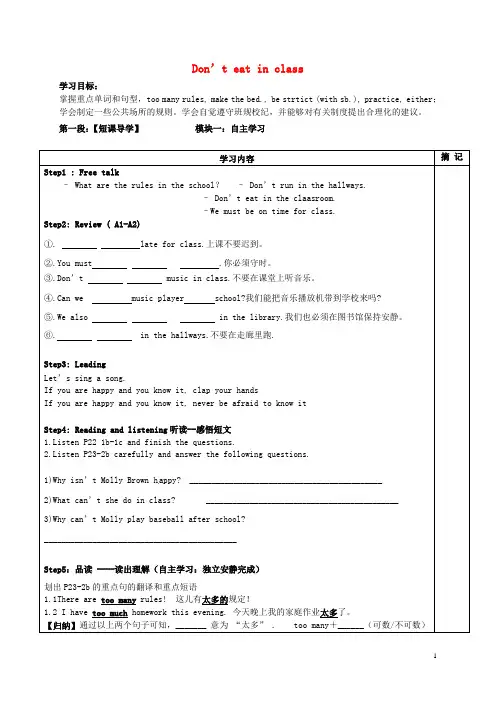
Don’t eat in class学习目标:掌握重点单词和句型,too many rules, make the bed., be strtict (with sb.), practice, either;学会制定一些公共场所的规则。
学会自觉遵守班规校纪,并能够对有关制度提出合理化的建议。
第一段:【短课导学】模块一:自主学习学习内容摘记Step1 : Free talk– What are the rules in the school?– Don’t run in the hallways.– Don’t eat in the claasroom.–We must be on time for class.Step2: Review ( A1-A2)①. late for class.上课不要迟到。
②.You must .你必须守时。
③.Don’t music in class.不要在课堂上听音乐。
④.Can we music player school?我们能把音乐播放机带到学校来吗?⑤.We also in the library.我们也必须在图书馆保持安静。
⑥. in the hallways.不要在走廊里跑.Step3: LeadingLet’s sing a song.If you are happy and you know it, clap your handsIf you are happy and you know it, never be afraid to know itStep4: Reading and listening听读--感悟短文1.Listen P22 1b-1c and finish the questions.2.Listen P23-2b carefully and answer the following questions.1)Why isn’t Molly Brown h appy? ____________________________________________2)What can’t she do in class? ____________________________________________3)Why can’t Molly play baseball after school?____________________________________________Step5:品读 ----读出理解(自主学习:独立安静完成)划出P23-2b的重点句的翻译和重点短语1.1There are too many rules! 这儿有太多的规定!1.2 I have too much homework this evening. 今天晚上我的家庭作业太多了。
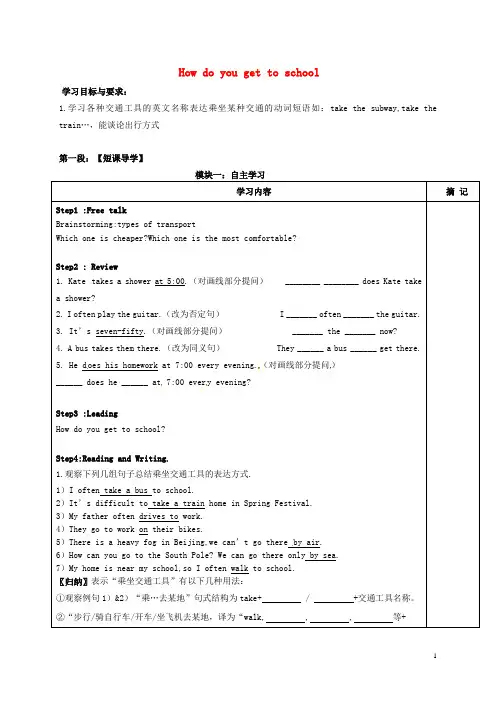
How do you get to school学习目标与要求:1.学习各种交通工具的英文名称表达乘坐某种交通的动词短语如:take the subway,take the train…,能谈论出行方式第一段:【短课导学】模块一:自主学习学习内容摘记Step1 :Free talkBrainstorming:types of transportWhich one is cheaper?Which one is the most comfortable?Step2 : Review1. Kate takes a shower at 5:00.(对画线部分提问) ________ ________ does Kate takea shower?2. I often play the guitar.(改为否定句) I _______ often _______ the guitar.3. It’s seven-fifty.(对画线部分提问) _______ the _______ now?4. A bus takes them there.(改为同义句) They ______ a bus ______ get there.5. He d oes his homework at 7:00 every evening.(对画线部分提问)______ does he ______ at 7:00 ever y evening?Step3 :LeadingHow do you get to school?Step4:Reading and Writing.1.观察下列几组句子总结乘坐交通工具的表达方式.1)I often take a bus to school.2)It’s difficult to take a train home in Spring Festival.3)My father often drives to work.4)They go to work on their bikes.5)There is a heavy fog in Beijing,we can’t go there by air.6)How can you go to the South Pole? We can go there only by sea.7)My home is near my school,so I often walk to school.〖归纳〗表示“乘坐交通工具”有以下几种用法:①观察例句1)&2)“乘…去某地”句式结构为take+ / +交通工具名称。
Unit 3 How do you get to school课题:Unit3 How do you get to school? Period 4 课型:阅读课【学习目标】一.学习并能说出和写出P17的单词:cross, river, village, bridge, boat,b etween...and…., ropeway, year, afraid, like, vi llager, leave, dream, come true 二.能根据图片和文章标题预测文章内容,并通过略读、扫读等阅读策略掌握文章详细内容,完成相关阅读任务。
三.能根据图片复述课文。
模块一:自主学习一、请根据中文意思写出下列单词。
1. 车站_____________2.横过_____________3.河_____________4. 村庄____________5.桥____________6.害怕的_____________7. 离开____________ 8.梦想_____________ 9.地铁二、请认真阅读课本P17,找出以下短语。
1.认为2.实现_____________3.between...and...____________三、请认真阅读课本P17,完成下列句子。
1. 对于许多学生来说,去上学很容易。
_______many students, _______is _______ _______get to school.2. 你能实现你的梦想吗?_______ your ______ _______true?模块二:阅读短文练习(2a-2b)Ⅰ Fast-reading.快速阅读Task1: Read the passage and guess what the passage about.Ⅱ Scanning(找读:快速找出文章中答案)1. How do the students in the village go to school?2. Why do they go to school like this?3. Does the boy like this school? Why?Ⅲ Detailed reading(精读,大声朗读短文,完成下列任务)Task1: Finish2c.Task2:Think about: What’s the villagers’ dream? Do you think their dream can cometrue? Why or why not?模块三:巩固作业I. Complete the sentences.1. Is it easy for them ______ (get) to school?2. The river runs too _______ (quick) for boats.3. His brother _______ (cross) the riv er on a ropeway every day.4. Can this dream _____ (come) true?5. All the _________ (village) want to have a nice bridge.6. It takes six hours to get to his ____________ (grandparents) home.I I.句型转换。
Unit 3 How do you get to school?学习目标:1.学习各种交通工具;2.会用how;how long;how far引导的特殊疑问句;第一段〖短课导学〗模块一:自主学习学习内容摘记1.翻译下列短语.乘火车乘地铁乘公共汽车骑自行车到达多远乘船每天2.自主探究一:观察下列几组句子总结乘坐交通工具的表达方式1)I often take a bus to school.2)It’s difficult to take a train home in Spring Festival.3)My father often goes to work by car.4)There is a heavy fog in Beijing,we can’t go there by air.5)How can you go to the South Pole? We can go there only by sea.6)My home is near my school,so I often walk to school.7)My mother either rides to work or rides to work.〖归纳〗表示“乘坐交通工具”有以下几种用法:①“take+the/a+交通工具名称(+地点名词)”意为“乘…去某地”。
例②“动词walk,ride,drive,fly等+to+地点名词”意为“步行/骑自行车/开车/坐飞机去某地,例如③“by+交通工具名词”意为“乘…”。
例如〖反馈训练〗1).我每天骑自行车到达学校。
2).他从不坐地铁去上班。
3.自主探究二:how引导的特殊疑问句请尝试列举how与一些形容词或副词组成的特殊疑问词(词组),引导特殊疑问句,并将其译成中文,如how old意为“多大”第二段〖长课导学〗模块二:交流研讨研讨内容摘记Step 1:Please check the answers in groups,then find the differences.Step 2:按照组长的分工,每位同学选择一个内容向全组同学进行交流。
Unit 3 How do you get to school?学习目标:1.复习本单元重要词组和句型;2.学习邮件写法;第一段〖短课导学〗模块一:自主学习学习内容摘记1.翻译下列短语.多远多久乘地铁到达实现去上班在…之间去上学2.自主探究一:1)回顾本单元重点句型。
依据实际情况补充问句或答语。
①-- ?--It’s 3 miles away from my school.②--How long does it take you to get to school every day?--③.----I go to school by school bus.2)翻译。
1.对于许多学生而言,到校是容易的。
2.拥有一座桥是他们的梦想。
3.自主探究二:E-mail书写如何到达目的地(写作内容&步骤)1)Please finish the exercise of 3a,then find out the writing tips.第二段〖长课导学〗模块二:交流研讨研讨内容摘记Step 1:Please check t he answers in groups,then find the differences.Step 2:按照组长的分工,每位同学选择一个内容向全组同学进行交流。
如有不同意见,请直接提出或质疑。
Step 3 根据自主探究二如何书写到达目的地的写作指导,完成P18--3b。
模块三:巩固内化学习任务摘记Step 1:记忆并背诵自主学习重点短语和句型Step 2:完成P18--self check习题。
Step:3 Fill in the blanks.How do students around the world get to school?In North America,most studentsgo to school on (校车);some also (步行)or(骑自行车)to school.In Japan,most students (乘地铁)toschool.In China,it depends on where you are.For example,Lin Fei is myfriend,and his home is about 10 kilometers from the school.He (动身去)school at 6:00a.m.First,he takes the bus to the No.30(公共汽车停靠站)。
Unit 3
学习目标:复习Unit 3单元的单词、短语和语句。
一、单项选择
()1. -__________ -By bus.
A. Why does he go to work?
B. How does he go to work?
C. When does she go to work?
D. Where does he work?
()2. Mike has __________ breakfast. Then he leaves home.
A. quick
B. a quick
C. one quick
D. an quick
()3. -Is your home __________ the park?
-No, it's __________ the park.
A. far to; near from
B. far from; near from
C. far from; near to
D. far to; near to
()4. -__________is it from your school to the zoo? -It's about six miles.
A. How much
B. How many
C. How long
D. How far
()5. I like to __________ my bike __________ the weekends.
A. take; in
B. catch; at
C. live; on
D. ride; on
()6. -Can you come to my party? -__________
A. Sure, I'd love to.
B.I'm sorry to hear that.
C. You're right.
D. That's all right.
()7. -Let's ask Jack to play __________ piano for the party. -All right.
A. /
B. a
C. an
D. the
()8. -They have __________ homework this weekend. -That's too bad.
A. too much
B. too many
C. much too
D. many too
()9. -Happy birthday to you. -__________
A. Thank you.
B. The same to you.
C. Happy birthday to you, too.
D. That's great.
()10.__________he is tired, __________he doesn;t stop to have a rest.
A. Though; but
B. Though; /
C. But; though
D. /; /
二、词汇
A) 根据句意及首字母提示,完成下列单词拼写。
1. My d_________ is to be an actor.
2. Football in China is very p__________. Everyone likes playing it.
3. There is going to be a basketball m __________next Monday.
4. His sister gets up at h __________past six in the morning.
5. Mr and Mrs Wang go to work by s __________every day.
B)根据名单补全句子。
1.My home is near.I ____________(步行)to school.
2.Li Lei ____________ the subway (乘地铁)to school every day.
3.His father often goes to Shanghai ____________ ____________(坐飞机).
4.If you don't want to be late,you'd better ____________ a ____________(打的).
5.____________ ____________ ____________(骑自行车)to work is good for our health,I think.
三、句型转换
1、 A. John usually walks to school.(同义)
B. John usually _____ to school _________ ________.
2、A. I usually take the bus to school(同义)
B. I usually _______ to school _______ bus.
3、It is four miles from my home to school.(提问)
____ ____ is it from my home to school?
4、It takes me twenty-five minutes to get from home to school.(提问)
______ _____ _____it _____ to get from home to school?
5、Did you take a train to Beijing?(同义)
Did you go to Beijing____ _____?
四、用方框中所给词或词组的正确形式填空,每个词或词组只用一次。
1. My mother was out, so I had to ____________ my little sister at home.
2. What about ____________ in the park on Sunday?
3. Miss Gao often ____________ to work.
4. The weather in China_____________that in America.
5. The twins want to be actors when they ______________
6. He ____________ school at 7:30 every day.
7. -What do you ____________the Chinese people? -They are very friendly.
8. Jim, let's ____________ the stone, it's dangerous on the road.
9. UN____________ the United Nations.
10. She often ____________ me ____________ my English.
五、完型填空
What do you do at the weekend? Some people like to (1 ) but others like to go out for (2) or to play soccer. My friend Jack works hard in a factory during the (3). At the weekend, he always does the (4) thing. On Saturday he (5) his car and on Sunday he goes with his family to a village by (6 ). His uncle and aunt have a farm(7). It isn't a big (8), but
there is always much to do on it. The children help to give the animals their (9). Jack and his wife help in the fields. At the end of the day, they' re all (10) and Jack's aunt gives them a big meal.
( )1. A. go to work B. stay at home C. go hiking D. see friends
( )2 A. a walk B. shop C. school D. something
( )3 A. day B. year C. holiday D. week
( )4 A. good B. hard C. same D. different
( )5 A. drives B. mends C. washes D. takes
( )6 A. car B. bus C. train D. bike
( )7 A. too B. here C. there D. near
( )8 A. that B. this C. it D. one
( )9 A. water B. food C. houses D. vegetables
( )10 A. happy B. thirsty C. tired D. hungry。